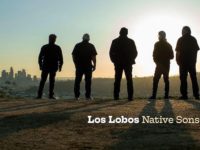Kiko is still, by any measure, their most unusual, yet satisfying album – that moment when the power and mystery of Los Lobos’ music found its fullest flowering in the off-the-wall pop atmospheres created by Mitchell Froom.
They’d put out tougher albums, albums that connected more directly with their Mexican-American heritage, even albums like 1990’s The Neighborhood that similarly attempted to expand their musical palate, but they never put out an album that did a better job of weaving all of those impulses together into a crossover format.
Producer Froom (along with Tchad Blake, who would later helm the Latin Playboys offshoot band) weren’t simply crafting an assimilationist curio, however. They never lost sight, even while applying these thrilling new impressionistic textures, of what made these songs by David Hidalgo and Louis Perez so topically brave, and still so foot-stampingly propulsive.
[SOMETHING ELSE! INTERVIEW: Steve Berlin discusses Los Lobos’ life in the wake of ‘La Bamba,’ a fateful evening with Levon Helm and the problem with their Paul Simon collaboration.]
In so doing, Kiko – released on May 26, 1992 – helped smash down the secondary barrier that was holding Los Lobos back: The post-“La Bamba” caricature of them as Mexican-folk rockers.
It’s a mysterious, completely transfixing triumph, a stunning amalgamation that stirred in a tasty penchant for R&B, looped-in vintage sound effects, and these mystical border-town atmospheres – all while dealing with a series of sharply modern inner-city topics like the scourge of homelessness (in “Angels with Dirty Faces”), the horror of rape (“Reva’s House”), and demons of alcoholism (“Whiskey Trail”).
Los Lobos certainly still hit a few four-on-the-floor grooves, notably on “The Train Don’t Stop Here.” But at the same time Kiko goes deeper into concurrent influences, even as it goes deeper into Los Lobos’ unique cultural milieu: You hear the sweet symphonic pop of the Beatles in “When the Circus Comes,” and the festive twilight mysteries of the barrio in “Rio de Tenampa.” There is a resolute joy about “Kiko and the Lavender Moon,” and a humbling grace to “Saint Behind the Glass.”
Taken together, they create their own world of sound, influenced by the band’s East L.A. roots, but not bound to them. Even today, Kiko remains Los Lobos’ most intriguing moment.
- Nick DeRiso’s Best of 2015 (Rock + Pop): Death Cab for Cutie, Joe Jackson, Toto + Others - January 18, 2016
- Nick DeRiso’s Best of 2015 (Blues, Jazz + R&B): Boz Scaggs, Gavin Harrison, Alabama Shakes - January 10, 2016
- Nick DeRiso’s Best of 2015 (Reissues + Live): John Oates, Led Zeppelin, Yes, Faces + others - January 7, 2016



